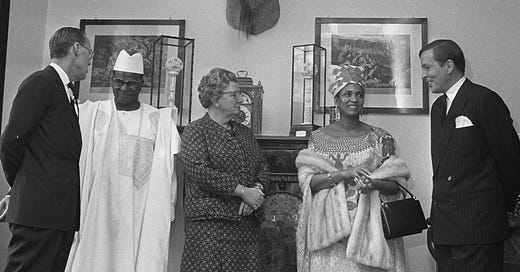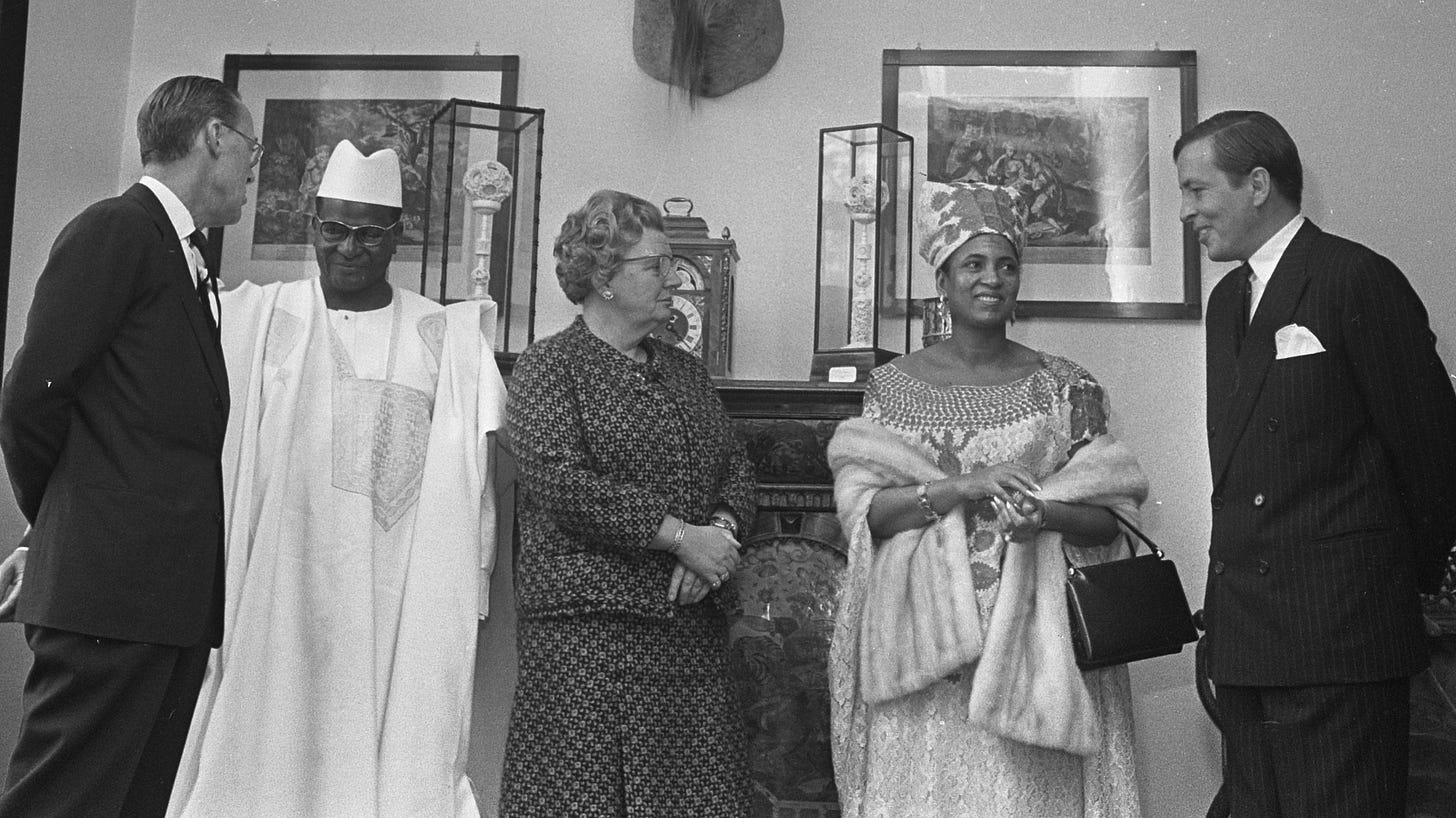
Discover more from Persuasion
Scotch with the President
As a Peace Corps volunteer in the 1960s, Daniel Chirot had an up-close view of Niger’s tragic corruption. Today it’s déjà vu, all over again.
I lived in Niger as a Peace Corps volunteer from 1964 to 1966. When I would tell stories about it I would be told that I obviously meant Nigeria. But no, Niger has far fewer people, is mostly desert, was once a French rather than British colony, and is one of those obscure countries hardly anyone in the United States knows much about. Now, Niger is in the news—another military coup, more anti-French demonstrations, jihadist attacks and killings, and possibly another coming famine. This time, however, Americans have over a thousand troops stationed in the country fighting international jihadist terrorism, the Chinese have mining interests in its uranium along with the French, and all of a sudden we are worried that Russian mercenaries might arrive to prop up the military dictatorship, as they have in neighboring Mali and Burkina Faso.
There is a long, sad story behind all this. The world is very different than it was in the 1960s, but in a sense it is, as Yogi Berra is reputed to have said, “déjà vu all over again.” For the United States, it is a different version of déjà vu. We are fighting Muslim extremists who are so far from being our military equal that they can be defeated over and over again, but somehow always come back until one day we’ll get tired and leave. Do we really help, or just postpone catastrophe?
In 1966 a black Mercedes pulled up to the house where I was staying in Niamey, the capital of Niger. The driver told me President Hamani Diori would like to see me this evening at his residence. I agreed, and that evening the same car came to pick me up. President Diori was fond of American Peace Corps volunteers, and though he was trying to learn English, those who spoke French fluently were particularly welcome. I was ushered into a small office where he shook my hand and asked if I wanted a glass of Scotch. I did.
We sat down and he showed me a New York Times article about corruption in Africa sent to him by Niger’s American embassy. A single paragraph was circled. The circled lines said that Hamani Diori was one of the most corrupt African leaders. He asked me to translate them into French. I was twenty-three and so embarrassed I could hardly mumble anything. Why ask me? He had enough people in his embassy and in Niamey who spoke English, so he certainly knew perfectly well what it said. I finally got it out. Then he asked me what kind of newspaper this was. I said one shouldn’t take journalists too seriously. He laughed and replied that his embassy had said that the New York Times was the most important newspaper in America. I had to agree. His wife showed up to say hello and left us. We then chatted about politics in Niger and America for a while.
Diori complained about some of the people around him who were too superstitious and how difficult they could be. I never asked why he hadn’t approached the American embassy about the article. I think he just wanted to talk to someone insignificant who might understand the pressures he was under, and perhaps I might relay my thoughts to other Americans. He didn’t elaborate, and I never could be sure what his intentions were.
Years later, in 1974, already a college professor, I read in the news that President Diori had been overthrown by his military. His wife, who was much hated because of accusations of corruption, had fought back and been shot. He was jailed for six years, then put under house arrest until 1987, and finally allowed to go into exile in Morocco. He went blind and died in 1989.
I liked him, though he was authoritarian, certainly was involved in some corruption, and was ultimately too dependent on French military assistance to remain in power. That was something which made him less than popular, but it was the famine caused by drought in the late 1960s and early 1970s that tipped the scales against him.
Diori never fully trusted, with good reason, a France that was more interested in Niger’s uranium than anything else. In 1974, suspecting that Diori was looking for an alternative to French support, the French did not come to his aid during the coup, though they had troops on hand who could have. In any case, after that Niger went through other coups, more droughts, more corruption, and more on-and-off intervention by the French.
The world changed. Niger got a lot of foreign aid, health conditions greatly improved, some progress was made in food production, but nonetheless Niger remained at or very near the bottom of the world in almost every indicator of economic well-being. Much of this can be attributed to its having the world’s highest birth rate and soaring population growth as infant mortality and general death rates fell. When I left Niger in 1966 it had about four million people. Now it has twenty-five million.
The unfortunate reality is that many of Niger’s problems were baked into its existence from the day it became independent in 1960 with Diori as its first president. It faced enormous odds in making itself a successful independent country. The substantial nomadic herding population was never popular with the ethnic majority farming people who dominate politics. That was particularly true of the pastoral Tuareg, who in precolonial times had raided the settled population in the south for slaves, but who were now deprived of their lordly status and increasingly marginalized due to their nomadic way of life. In Niger and neighboring Mali the Tuareg were from the start potential, and then actual, rebels. (Diori’s presidential guards were Tuareg; they fought back against the 1974 coup but were overcome.)
Relations between Fulani ethnic herders and Hausa or other farmers were already tense over control of grazing lands in 1960. Conflicts have become much worse as population growth has led to farming on lands that in the past were more suited to grazing. Disputes once fought out with swords and arrows over the lands have since been carried out with Kalashnikovs, and they are more deadly than ever.
Educational opportunities have vastly expanded since 1960, but job opportunities have not kept up. This encourages aspiring young people to emigrate, a dangerous proposition. The presence of uranium and oil has created a sense that the country should be more prosperous, but that has not happened. All that was going on sixty years ago and has worsened. And now the effects of global warming make it harder than ever to use semi-desert land. Add, too, the growing presence of Jihadist extremists able to recruit available young men from ethnic herding minorities who see no other viable future for themselves.
The French, for all their colonial and neocolonial sins, have in recent years been helpful. Thanks as well to American and other European aid, Niger had in recent years been growing economically and become a bit more secure. Yet, it could never be enough to overcome all its inherent problems. Niger needs to reduce population growth. A country with limited opportunities and a tradition of corruption is not going to reform itself quickly or easily. Mining and oil extraction create few jobs but present a great opportunity by whoever is in power to skim off royalties that then do little to help the general population.
After a relatively successful period of progress under President Mohamed Bazoum, along came another coup in July that throws all that progress into doubt. Is there an explanation? Yes. Progress wasn’t and could not be enough. More than this, once top military men saw that the effort to clean up corruption might lead to their losing access to the spoils of power, they felt there was no alternative to a coup. It was easy to rile up people against the French, who were the very face of European condescension and racism. It was easy to point out that despite some improvement the jihadist menace was not going away. It could be argued that with its mineral wealth Niger should be a richer country, though that is not really the case. Hope, resentment, fear, and distrust of Europeans all played a part. Mostly, however, it was money.
Can anything positive come out of this coup? Sadly enough, no. The coup will be like previous ones, only perhaps even worse. The military junta can’t hold back the jihadists without foreign military aid. It might invite Russian mercenaries to protect itself, but they will not help the general population, as all they do beyond keeping crooks in power is massacre, rape, and loot. More villagers will turn against the government. Birth rates are going down, but too slowly. Where there recently seemed to be some hope, there will be less.
Maybe the generals will let the Americans stay in their base in the desert city of Agadez. That is what the American government hopes as it continues its war on terror. Whether it stays or goes won’t, in the long run, change much. The United States might continue foreign aid, and that can help, but it is not close to enough to make a big difference. For France this is just one more step toward ending its now anachronistic neocolonialism.
In 1966 we young Americans in the Peace Corps were naively optimistic. I don’t know how hopeful Hamani Diori was because, for all his faults, he understood the challenges Niger faced. I think he chose to consolidate his corrupt autocracy because he sensed that the best-laid plans and aid wouldn’t work anyway. I have no doubt that the latest military rulers of Niger are even more cynical, and that the reasoning behind U.S. military intervention—far more costly than the tiny Peace Corps group that was present back then—is in its own way just as naive about what can be accomplished. I had friends in Niger, and I feel so sad for those still alive and their descendants.
Daniel Chirot, an editorial board member of American Purpose, is the Emeritus Herbert J. Ellison Professor of Russian and Eurasian Studies at the Henry Jackson School of International Studies at the University of Washington.
Image: Former president of Niger Diori Hamani and First Lady Aïchatou Diori (second and third from left) are hosted by Prince Bernhard, Queen Juliana, and Prince Claus of the Netherlands at Soestdijk Palace, October 8, 1968. (National Archives of the Netherlands)
Subscribe to Persuasion
The community for those who believe that a free society is worth fighting for.





